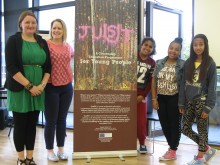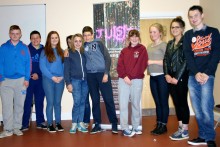Rationale and need for JustUs
‘What’s your name?’ ‘Where are you from?’ and ‘What school do you go to?’ may sound like innocent enough questions but for young people living here they are often highly charged questions that lock them into the legacy of the violent political conflict in and about ‘Northern Ireland’. They sit in a labyrinth of identity issues laced with tension that young people need perspective on if they are to be better able to negotiate and overcome the polarised social world they are growing up in.
 Over the course of delivering epilogues our innovative conflict transformation programme, across civil society here, there was a constant call for resources that could do similar work with young people. We were acutely aware that while the methodology and multiple perspective approach utilised in epilogues would work, it would require an entirely new project with a content specifically targeted at the issues young people were grappling with. This was confirmed when we piloted epilogues with young people in 2007 and reinforced by the independent evaluation commissioned on the efficacy of the epilogues approach by the educationalist Michael Arlow. (M. Arlow, 2008). That project would become ‘JustUs’.
Over the course of delivering epilogues our innovative conflict transformation programme, across civil society here, there was a constant call for resources that could do similar work with young people. We were acutely aware that while the methodology and multiple perspective approach utilised in epilogues would work, it would require an entirely new project with a content specifically targeted at the issues young people were grappling with. This was confirmed when we piloted epilogues with young people in 2007 and reinforced by the independent evaluation commissioned on the efficacy of the epilogues approach by the educationalist Michael Arlow. (M. Arlow, 2008). That project would become ‘JustUs’.
 The critical need for such a project was identified in the 2009 Report of the Consultative Group on the Past (Bradley/Eames) when it pointed to concerns, ‘that resources are not being made available to support the next generation to cope with the legacy of the conflict’ in Northern Ireland. It pointed up ‘the importance of education in building an understanding of the nature and causes of the conflict’. Equally the study of the same year by the University of Ulster titled, ‘The Role of Education in Reconciliation’ reinforced this view with the findings suggesting that ‘the task [of creating such resources] can only be undertaken if there’s a commitment to include multiple perspectives and encourage critical thinking.’ This is important and significant because it has also been identified that
The critical need for such a project was identified in the 2009 Report of the Consultative Group on the Past (Bradley/Eames) when it pointed to concerns, ‘that resources are not being made available to support the next generation to cope with the legacy of the conflict’ in Northern Ireland. It pointed up ‘the importance of education in building an understanding of the nature and causes of the conflict’. Equally the study of the same year by the University of Ulster titled, ‘The Role of Education in Reconciliation’ reinforced this view with the findings suggesting that ‘the task [of creating such resources] can only be undertaken if there’s a commitment to include multiple perspectives and encourage critical thinking.’ This is important and significant because it has also been identified that
“In Northern Ireland it was recognised that at the heart of the conflict in society there were contested national histories and identities. No common history could tell the ’nation’s story’”, (Low-Beer 1999).
 This was exactly why a multiple perspective approach was adopted by GMT in epilogues and is what we believe explains its success as an educational intervention for adult citizens here. It is also the approach now taken by JustUs for younger citizens. The intervention is purposely designed to enable them to address sensitive and controversial issues, issues that have tended to be avoided in the class-room and youth work settings.
This was exactly why a multiple perspective approach was adopted by GMT in epilogues and is what we believe explains its success as an educational intervention for adult citizens here. It is also the approach now taken by JustUs for younger citizens. The intervention is purposely designed to enable them to address sensitive and controversial issues, issues that have tended to be avoided in the class-room and youth work settings.
